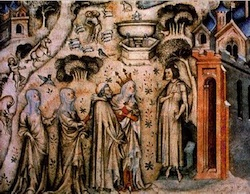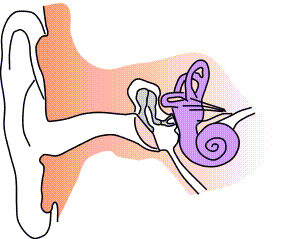Letting Go of 20th-Century Historicism
Like most composers, I absorbed certain widely accepted musical axioms from my university studies, but they’ve never been entirely satisfying. As a consequence, I constantly search for better explanations, in the process hopefully becoming a better artist. One of the issues I’m increasingly focusing on is how music history is interpreted. Although I have previously argued for an enhanced role for music history in composer education, I also think we need to re-examine how we use (and abuse) that history. In my own practice, letting go of false history-based causative associations, what I see as a kind of compositional historicism, has paid creative dividends.
I’ve been working in this anti-historicism vein for a while, but a couple of experiences this spring really drove things home for me. In March I spent two weeks workshopping the first act of my opera-in-development with Tapestry New Opera and a fantastic pick-up cast of singers. Then in April the Quatuor Bozzini premiered a new string quartet of mine in Montreal. I’ll explain more below, but first let me explain what I mean by “false history-based causative associations”.
Historicism as a handicap

Candlestick chart of gold prices between 1968 and 2008
The teleological view of music history does an artistic disservice to composers. We can learn a lot about the right and wrong ways of employing music history by looking at economics, especially the lessons of the “chartists” or technical analysts that started using price data to predict trends in the 1970s. In the stock market and in music, what worked in the past tells us exactly nothing about what should work in the future. True, we know that certain patterns repeat themselves, and that on average trends have followed those patterns most of the time, but none of that knowledge matters when you sit down to make a trading decision. The only thing that matters is whether your stock goes up or down, and if you buy or sell it at the right time. For those decisions, you’re at the mercy of factors that don’t care about the averaging process or your trend, and you may end up losing all your money because what looks like a string of textbook long-legged doji ends up being an anomaly before a price crash. On a larger level, this same problem is plaguing Ben Bernanke, who is a student of the Great Depression yet grappling with why the Great Recession seems to be behaving differently.
Composition history is similar to economic history in many ways. What worked historically does not tell you what will work today, and therefore it doesn’t matter what trends you think you see—all that matters is if your amazing piece of music ends up making an impact or not. In the end, the complex theories people have proposed basically boil down to the same stuff as leading high school essay questions like “Explain why the United States Constitution makes America the freest country in the world”. Sure, the U.S. Constitution, Karlheinz Stockhausen, and aged Gouda cheese may be great things, but their greatness doesn’t necessarily solve your problems if you are a Bolivian, a 21st-century composer, or a vegan respectively.
Historicism versus historical persons

Guillaume de Machaut
There was great music created in many periods before our own, but from what I can gather, little of it gave much thought to its place in history or what had come before it. Although great composers such as Bach and Beethoven turned to the generations immediately preceding them for inspiration, the long view of the progression of music history didn’t really exist. Even theoretical texts such as Fuchs’ Gradus ad Parnassum simply tried to codify the “right” way to compose music. Historical musicians weren’t justifying themselves against something else; they were simply trying to explain how the music they liked worked, and in many cases, they didn’t even acknowledge that other kinds of music even existed.
Yet when I started googling Fuchs to fact-check my claims, the first site I came across opens with this statement:
The whole history of western tonal music could be seen, in a way, as the history of the treatment of the vertical dissonance.
A prime example of an academic historicist platitude, incidentally followed by lip service to the problems of such a linear view of history before doubling back to say, “To a large extent, that notion is true.” I’m not saying there’s no truth in this historicist view of music, but it certainly isn’t the only view with merit. After all, the authors of the 18th-century texts being cited on contrapunctus.com didn’t espouse modernist historicism.
That doesn’t mean the treatment of dissonance wasn’t a unifying trend in Western tonal music. It also doesn’t mean a composer can’t write great music based on that principle, but that’s besides the point. The music Western composers have written is not good because it might reflect the march toward ever more complex dissonances; it’s good because it found a place in people’s hearts and minds. Yet historicism encourages us to focus on certain ways of looking at the world that have nothing to do with the reason the music has lasted.
Historicism was perhaps the single most unifying trend of 20th-century art music, and indeed, of much 20th-century thought. We see this attitude most directly with the serialists, but it’s also a powerful force in the branch of the minimalist movement that reacts against those ideas by creating progression-free music, or the neo-Romantic movement that tries to “go back” to a purer time before the “mistake” of modernism, or in the totalists or maximalists who eschew anything from the European tradition because it’s somehow not relevant enough today. All of this is beating around the bush, justifying away the problem that it’s simply hard to create good music, no matter when in history you happen to live.
Music as Biology
 ](http://commons.wikimedia.org/wiki/File:Ear-anatomy-notext-small.png ‘Iain at the English language Wikipedia [GFDL (www.gnu.org/copyleft/fdl.html) or CC-BY-SA-3.0 (www.creativecommons.org/licenses/by-sa/3.0/)
](http://commons.wikimedia.org/wiki/File:Ear-anatomy-notext-small.png ‘Iain at the English language Wikipedia [GFDL (www.gnu.org/copyleft/fdl.html) or CC-BY-SA-3.0 (www.creativecommons.org/licenses/by-sa/3.0/)
We know more today about the anthropological development of music than ever before. Looking at human evolution, there are clear reasons why music was invented. Some of them have to do with memorizing and transmitting information, or reinforcing group rituals, or organizing a large group of people for a given task. Since the development of music, some of these purposes have been essentially replaced by more efficient technological breakthroughs (writing is a more effective way of storing information than epic ballads). Other uses, however, remain entirely or at least predominantly musical. Few forces bond and join groups of people together like music. This is why music choice is so essential to the identity of teenagers, who are frantically trying to define themselves within society. It’s also why most songs are about love or religion.
It seems too obvious to say that the purpose of music is to move listeners, but we tend to forget this because such a basic explanation doesn’t strike us as insightful enough. But biology is what it is. Language is designed to communicate information, flirting to produce offspring, taste to lead us to quality foods, intelligence to develop a survival advantage, and music to motivate us. There’s nothing wrong with it being that simple.
Music is the original—and remains the best—way of transmitting motivational, transcendental, emotional information. That’s why everyone knows the two-note scene transition phrase from Law & Order. It’s also why retailers play loud, trendy music in clothing stores to get you to buy something.
Transcendence versus Selling Out

Taking a bribe
You may think I’m trying to justify the abuse of music here, but it’s not necessary to abuse music to rely on its fundamental principles. Humans are social animals designed to react emotionally to music, but emotional reactions don’t need to be clichéd or uninformed. People with developed palates find richer experiences emotional and transcendental, but they still seek that social connection of feeling like they are part of something grander than themselves. Even Anton Webern talked about “expression” and “keeping an open heart”.
It’s okay and even a valuable thing to write music that is meant for a minority. In fact, I think it’s one of the greatest things you can do as an artist: to represent the emotional and transcendental needs of an underserved group. Why should everyone have the same taste? We are richer as a society when we cultivate difference.
On the flip side, there’s little to justify the kind of high-brow cultural snobbery that fuelled so much 20th-century artistic discourse. Complexity doesn’t matter. Dissonance doesn’t matter. Nor does minimalism, tonality, grooves, pop music, or world-music influences. Use those things or don’t, but remember that the only important part of the music is the people who use it.
Case Study: Oksana G.
As a result of these ideas, I’ve been trying to make people the overruling concern in my composing, and the two pieces I’m going to describe are ones in which I felt I succeeded. I don’t have a grand theory about why or how I made them work. It was largely intuitive, and I avoided thinking too hard about the how and why because, frankly, I was on too tight of a deadline for philosophical musings.
My modus operandus with Oksana G. thus far has been to set the story in a way that expresses its underlying concerns while respecting the limitations of the human voice. My key concern has been diction. Some of the piece is tonal, some is modal, some is atonal. I think so anyway—I haven’t really looked at any of the harmonic structure that closely. Oksana G. is through-composed and there are no set numbers. Dissonance-wise, it’s somewhere between Richard Strauss and Alban Berg.
Now for the people part: The singers really loved it and gave their all, in a way I haven’t often experienced in rehearsal. It was really invigorating. The audiences both nights also had incredibly positive things to say. We even had a fair contingent that came solely for the subject matter (sex trafficking) with no interest in or knowledge of opera or new music, and yet who came up to me to tell me how moved they were and how much they looked forward to the finished production. Conversely, I got a lot of enthusiastic feedback from other composers.
Case Study: Se contourner se conformer
Se contourner se conformer is a short string quartet I wrote for the Quatuor Bozzini. In it, I wanted to go back to quartertone harmonies, which I had set aside in the preceding few years. I also wanted to write something sort of gentle and pretty, and also something idiomatic for the ensemble. I decided to try to make the quartertones disappear, so that the casual listener wouldn’t really notice them. I ended up with something sort of like twisted Renaissance just intonation.
In the first few rehearsals, the quartet was a bit confused. They thought it was just a bad neo-Romantic piece with quartertones thrown in to “make it modern”. But as they started to put it together, suddenly everyone’s perspective changed. By the concert, they were really loving it, jumping around on stage and breathing and swaying expressively. And after the performance, again, many people came up to tell me it was like nothing they had ever heard and that it moved them deeply. I received many, many vigorous handshakes from strangers, instead of the usual polite congratulations from colleagues.
As a result, I’m more convinced than ever before of the value of intuition and a tempered historical perspective. I love music history and find it fascinating. But I’m not going to take any career advice from Mozart.


